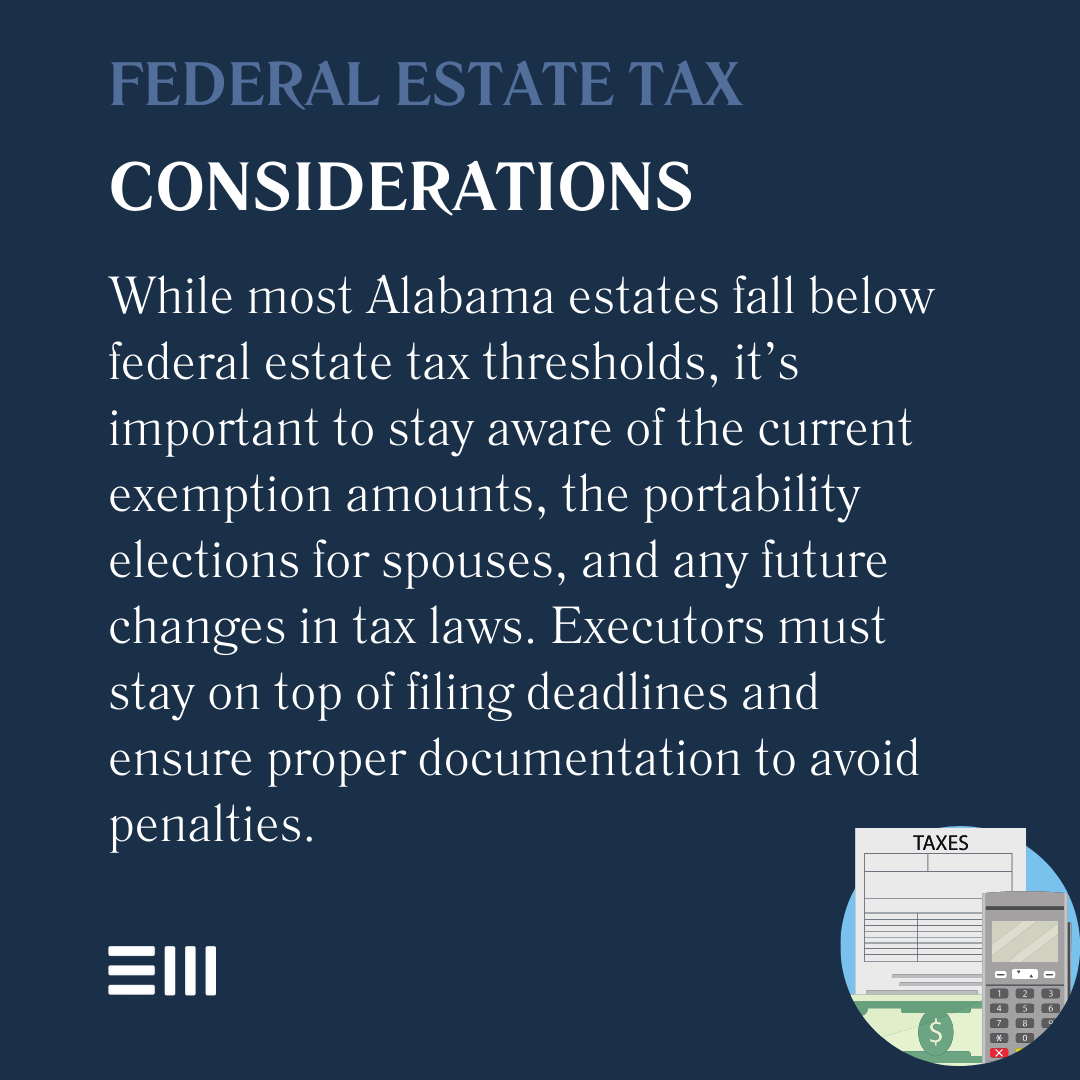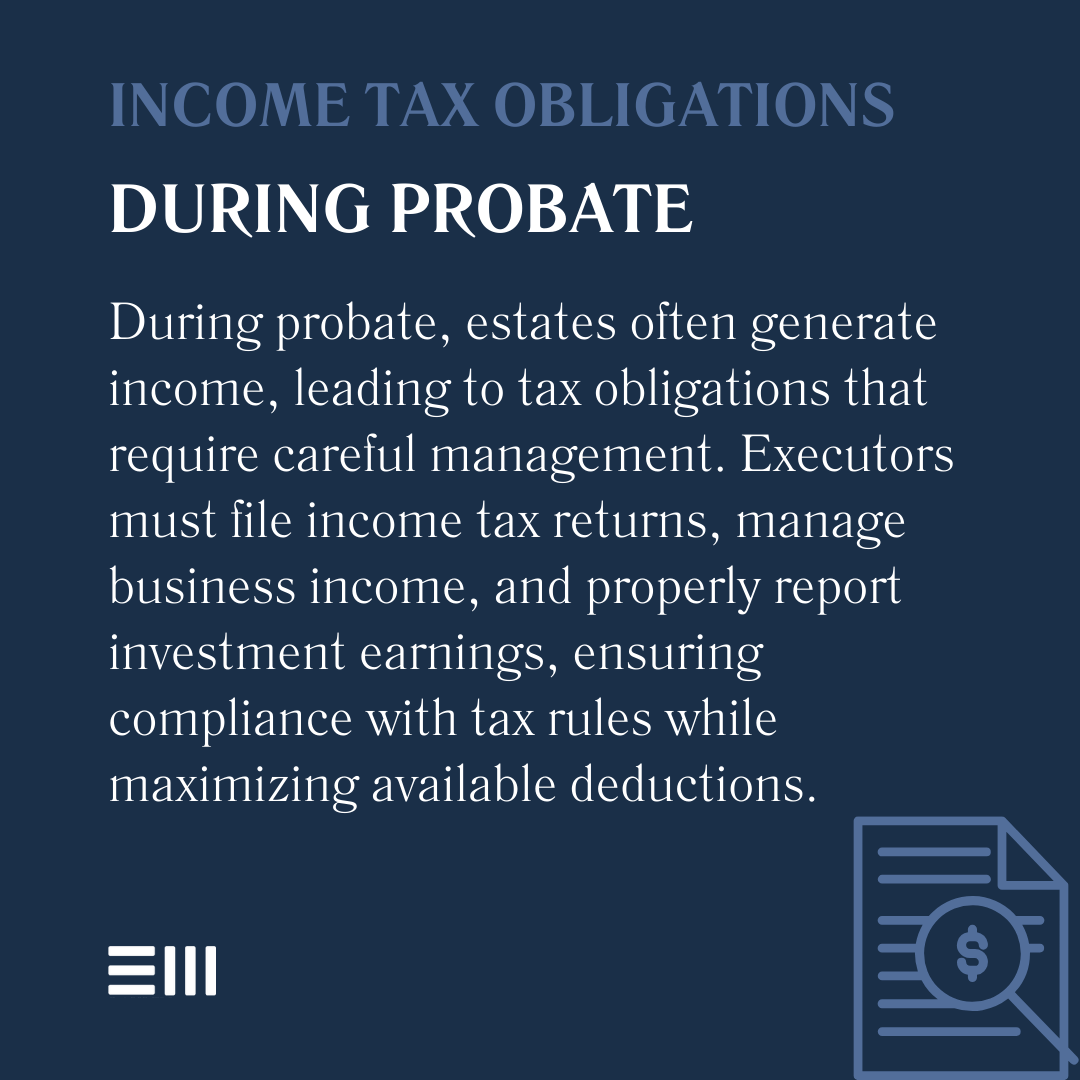As families gather around kitchen tables across Alabama, sorting through paperwork after losing a loved one, a quiet sigh of relief often follows one discovery: Alabama stands among the minority of states that does not impose its own estate tax.
Yet navigating the intersection of probate and taxes still requires careful attention—where one tax obligation ends, another often begins, creating a complex web of responsibilities that executors must carefully unravel.
Understanding Estate Tax Obligations
While Alabama residents benefit from the absence of a state estate tax, executors must still navigate various tax responsibilities during probate.
Understanding these obligations helps ensure proper estate administration and prevents costly oversights that could impact both the estate and its beneficiaries.
Key tax considerations include:
- Federal estate tax thresholds and exemptions for current and future years;
- Income tax obligations for the estate during administration period;
- Final individual tax returns and filing requirements;
- Tax basis adjustments for various types of inherited property;
- Generation-skipping transfer tax issues and exemption amounts;
- Gift tax implications for recent transfers and annual exclusions;
- State tax obligations for out-of-state property ownership;
- Business ownership tax considerations and succession planning;
- Special valuation rules for family farms and closely-held businesses;
- Deduction planning and allocation strategies;
- Tax implications of charitable bequests; and
- Income in respect of decedent considerations.
Proper understanding of these tax obligations helps executors fulfill their duties effectively.
Clear documentation and professional guidance often prove valuable in managing complex tax situations and ensuring compliance with all requirements.
Federal Estate Tax Considerations
While most Alabama estates fall below federal estate tax thresholds, understanding these requirements remains important for proper estate planning and administration, particularly given potential future changes in exemption amounts.
Important federal considerations include:
- Current exemption amounts and scheduled future changes;
- Portability elections between spouses and filing requirements;
- Lifetime gift tax exemption coordination and tracking;
- Special valuation rules for farms and businesses under Section 2032A;
- Charitable deduction requirements and documentation;
- Marital deduction provisions and QTIP elections;
- Estate tax return filing deadlines and extension options;
- Payment options for taxable estates, including installment payments;
- Alternative valuation date elections under Section 2032;
- State death tax credit considerations for out-of-state property;
- Business valuation discounts and supporting documentation; and
- Generation-skipping transfer tax planning opportunities.
Understanding federal requirements helps executors plan effectively and meet all obligations. Proper timing and documentation remain crucial for tax compliance and avoiding penalties.
Income Tax Obligations During Probate
Estates often generate income during administration, creating tax obligations that require careful attention and proper reporting.
Understanding these requirements helps prevent costly mistakes and ensures proper tax treatment.
Key income tax considerations include:
- Estate income tax return requirements and filing thresholds;
- Tax identification number acquisition and usage guidelines;
- Income distribution deduction rules and calculations;
- Final individual tax return filing and reporting requirements;
- Medical expense deduction timing and limitations;
- Investment income reporting and basis considerations;
- Rental income management and expense allocation;
- Business income continuation and reporting requirements;
- Passive activity loss rules and carryovers;
- Partnership and S-corporation income reporting;
- Required minimum distribution planning; and
- Alternative minimum tax implications.
Proper handling of income tax obligations prevents complications and penalties. Regular monitoring and timely filing help ensure compliance throughout administration while maximizing available deductions.
Property Tax and Basis Adjustments
Understanding property tax obligations and basis adjustments help beneficiaries manage inherited assets effectively and minimize future tax impacts.
Important property considerations include:
- Step-up in basis rules;
- Property tax assessment timing;
- Special use valuation options;
- Real estate tax proration;
- Business property considerations;
- Vehicle tax obligations;
- Mineral rights taxation; and
- Agricultural property provisions.
A clear understanding of these rules helps maximize tax benefits for beneficiaries. Proper documentation supports future basis calculations and tax positions.
Tax Planning Strategies
Strategic tax planning during probate can help minimize obligations while ensuring full compliance with all requirements.
Proper planning benefits both the estate and its beneficiaries.
Effective strategies include:
- Timing of estate distributions;
- Income tax election choices;
- Charitable giving options;
- Business succession planning;
- Asset distribution structuring;
- Basis adjustment maximization;
- Loss harvesting opportunities; and
- Alternative valuation elections.
Implementation of appropriate strategies helps optimize tax outcomes. Professional guidance often proves valuable in identifying opportunities.
Frequently Asked Questions About Estate Taxes in Alabama
Estate tax obligations often raise complex questions during probate administration.
Here are answers to common questions about managing tax obligations in Alabama estates.
Does Alabama Have an Estate Tax?
No, Alabama does not impose a state estate tax. However, estates may still face federal estate tax obligations and other tax considerations during administration.
When Must an Estate File a Federal Estate Tax Return?
Estates exceeding the federal exemption amount (currently $12.92 million in 2023) must file Form 706. Some estates below this threshold may choose to file to preserve portability.
How Are Inherited Assets Taxed in Alabama?
Most inherited assets receive a step-up in basis to fair market value at death, potentially reducing future capital gains tax liability for beneficiaries.
What Tax Returns Must an Estate File?
Estates may need to file final individual returns, estate income tax returns, and possibly federal estate tax returns, depending on circumstances.
How Long Do I Have to File Estate Tax Returns?
Federal estate tax returns are typically due nine months after death, with a six-month extension available. Income tax deadlines vary based on the estate's tax year.
What About Property Taxes During Probate?
Property taxes continue during probate administration and must be paid to maintain good standing, though payment timing may affect deduction allocation.
Administrative Requirements
Proper administration requires attention to various tax-related procedures and deadlines throughout the probate process.
Essential requirements include:
- Tax identification number acquisition;
- Required tax return filings;
- Payment deadline monitoring;
- Record keeping requirements;
- Notice to tax authorities;
- Beneficiary tax reporting;
- Final return preparations; and
- Closing letter requests.
Meeting these requirements helps ensure smooth administration. Careful attention to deadlines and documentation supports compliance efforts.
Secure Your Estate Tax Guidance
Understanding tax obligations during probate helps ensure proper administration and compliance.
Our experienced team can help you navigate complex tax requirements while maximizing available benefits.


